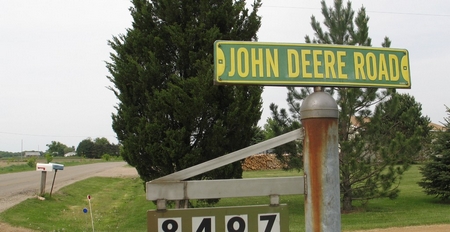Sunday afternoon I listened to a horrible book on an otherwise nice bike ride. The book was “The John Deere Way: Performance that Endures” by David Magee.
John Deere has always had a positive image in my mind, at least until yesterday. Hearing an old Johnny Popper will bring back good memories from when I was a kid; even more so for my wife, who was raised on an Iowa farm where she sometimes drove one. A toy-sized John Deere tractor has an honored place in our bedroom, even if it isn’t the type of Model B that she had on the farm. John Deere makes good, though not inexpensive, lawn tractors.
People put signs like this in their yards. I saw two of them yesterday, one at a working farm, and the other at a former farmstead. I understand.
But unfortunately the name John Deere is now going to be associated in my mind with that book. It supposedly was written by an independent author, not a corporate flack. Perhaps it’s a good thing, because your average corporate PR drone probably could not stomach his/her craft taken to such an extreme.
I don’t know what point size was used in the written version, but I’ll bet it set a record for the most corporate platitudes per square inch, most of them repeated over and over again. There were phrases delivered straight, like “John Deere works to deliver higher productivity,” “commitment to products,” “founding tenets: quality, innovation, integrity, commitment,” and “striking design and bold new power in tractors.” For informative content, we are given things like, “[John Deere] was first to add pride to productivity for farmers.”
The phrase, “for example” is used several times in the book, but is never followed by anything very true-to-life and not obviously vetted by the top corporate levels. Early in the book we learned that a lot of Deere employees stay with the company a long time. We are told the younger ones learn by example from the older ones, but we are not given an example of how that really works.
A tiny bit of useful information leaked out when the author/corporate message contradicted itself. We learn that John Deere carried many of its customers through the bad years of the Depression, and that it has a history of supporting its dealers through bad times when they have unsold inventory. But while we’re told about continuity and the original core values of business, and how “the new has built on strengths of the old,” we also learn that the very newest way of this decade is basically turning the old on its head. The company is now going to emphasize the return to shareholders, and that means no more providing interest-free loans to dealers, and basically no more Mr. Nice Guy. It’s going the way of most large corporations in the current environment. I can’t begrudge John Deere for having to go a new direction, but it would be nice if the corporate line, channeled through David Magee, was not about how there is a John Deere way.
John Deere can be thankful that most people will never even hear of this sycophantic book.
